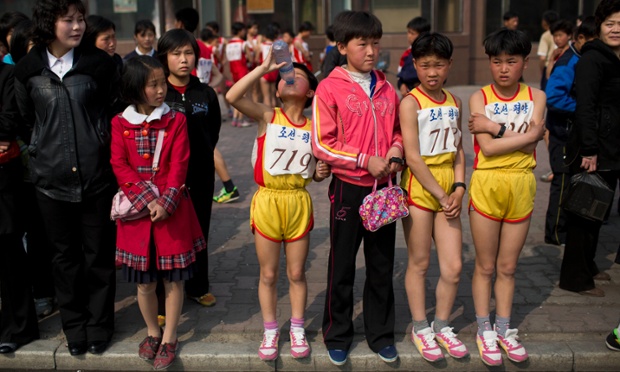- California Assembly OKs highest minimum wage in nation
- S. Korea unveils first graphic cigarette warnings
- US joins with South Korea, Japan in bid to deter North Korea
- LPGA golfer Chun In-gee finally back in action
- S. Korea won’t be top seed in final World Cup qualification round
- US men’s soccer misses 2nd straight Olympics
- US back on track in qualifying with 4-0 win over Guatemala
- High-intensity workout injuries spawn cottage industry
- CDC expands range of Zika mosquitoes into parts of Northeast
- Who knew? ‘The Walking Dead’ is helping families connect
N. Korean famine stunts youth growth: report

Young North Korean runners rest after finishing their part of the Mangyongdae Prize International Marathon in 2014. (David Guttenfelder/AP)
SEJONG (Yonhap) — Severe malnutrition stemming from North Korea’s devastating famine in the mid-1990s appears to have seriously undermined the growth of youths in the impoverished country, a report claimed Tuesday.
According to the report by the Korea Development Institute (KDI), young people in the country between the ages of 15 through 21 underwent the famine during their critical formative years and may have had their growth stunted.
The North was gripped by famine from 1994 to 2000, before the country’s situation improved with aid from abroad and better crop harvests, said the report based on data provided by the World Food Programme, the United Nations Children’s Fund and testimonies from defectors.
It estimated 20.8 percent of North Korean children suffered from acute malnutrition in 1998, with 55.5 percent underweight and 63.9 percent classified as chronically malnourished.
“At the time, the health of children was actually worse than those who lived in South Asia and Sub-Saharan Africa,” the institute said. “Such poor conditions affected the growth of children and babies as it affected the nutritional levels of young people, which impacted their weight and height.”
Reflecting this, media reports have claimed that as of 2014, the minimum height requirement of new recruits in the North Korean military was lowered to 143 centimeters (56 inches).
The report also said that with girls and young women between the ages of 15 through 21 expected to bear children in the next five to 15 years, there are rising health risks for newborns.
In the future, humanitarian aid going to North Korea needs to be concentrated on malnutrition and the health of young mothers, it suggested.












![일본 사도광산 [서경덕 교수 제공. 재판매 및 DB 금지]](http://www.koreatimesus.com/wp-content/uploads/2024/07/PYH2024072610800050400_P4-copy-120x134.jpg)


